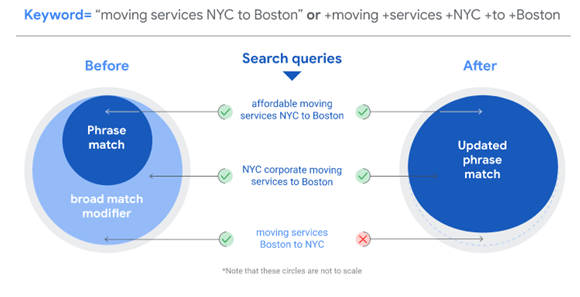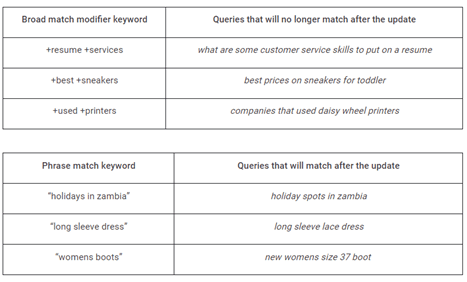Google has announced that phrase match will begin taking over modified broad match from mid-February.
“To give you more control and better reach, we’re bringing the best of broad match modifier into phrase match.”
This could be a big change for paid search advertisers, which is why Google will be rolling the changes out slowly over several months. We’re going to take a look at how search queries will match to keywords going forward and what this really means for digital marketing agencies like us.
What’s changing?
With Google’s announcement, The modified broad match versions of keywords will be sunset and phrase match will be expanding to cover modified BMM traffic, essentially combining the two.
You will still be able to add BMM keywords until July. From that point, new and existing keywords will be matched based on the update.
How will it work?
As it stands with BMM, you can tell Google which terms should be present in a query by adding the required keywords as a plus (+). Phrase match is more specific because it respects word order.
Google note that phrase match will now cover both of these requirements but will assess whether word order is important to the meaning. In other words, user intent will be considered when matching a search.
Here’s how this should look according to Google:

Google’s example demonstrates a moving company aiming to help customers move from New York to Boston, but not from Boston to New York. The advertiser could specify this through phrase match.
These are some more examples from Google, showing the new matching behaviour:

Preparing for the rollout
Google predict that the change will help advertisers streamline keyword management and save time for other business objectives. This is because the two match types should cover the majority of searches that advertisers want to show for.
Google advises monitoring performance and budgets as traffic might start to change as a result of the changes around mid-February. Things like checking your Recommendations page will be important as there could be more duplicate, redundant keywords.
Our take on the announcement
This is a big change but one we had expected. Phrase match had become mostly redundant and BMM wasn’t always showing the terms you had included as a plus due to Google’s matching. For example, we were running some activity for a client that needed +hire otherwise we were appearing against sales terms, yet BMM was surfacing us against these terms that didn’t include hire.
I think the move to phrase only instead of BMM only, will remove the implied promise that the + means the search must include that term, to one where the advertiser can expect to appear against different terms where the intent is matched. If it works as promised it should be fine, but we’ll be keeping a close eye as ever to see what we appear against in future.
It’s important that your account is structured for today’s Google Ads with automation and intent matching so important, as we have moved a long way now from these old account structures that essentially replicated accounts in 3 match types. Now more than ever it’s time to rethink your account structures rather than trying to implement any simple workarounds following this change.
Paul Henderson – Founder & MD
You can read Google’s full announcement here.
